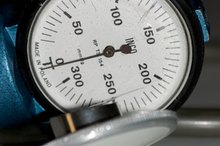What does fact checked mean?
At Healthfully, we strive to deliver objective content that is accurate and up-to-date. Our team periodically reviews articles in order to ensure content quality. The sources cited below consist of evidence from peer-reviewed journals, prominent medical organizations, academic associations, and government data.
The information contained on this site is for informational purposes only, and should not be used as a substitute for the advice of a professional health care provider. Please check with the appropriate physician regarding health questions and concerns. Although we strive to deliver accurate and up-to-date information, no guarantee to that effect is made.
Normal Pulse Rate at 13 Years Old
The pulse is the number of times a heart beats in a minute 1. This measurement is considered vital because it gives so much information about heart function. There is a range of beats per minute that is considered normal, and it differs depending on age.
Measuring the Pulse
The pulse rate is usually the same as the heart rate 12. It is easy to measure and can be felt at various points on the body. Two of the most common areas are the side of the neck and the wrist. Put pressure on the point where the pulse is felt and count for a minute 1. If you count for less than a minute, multiply to make a minute. For example, if you count for 10 seconds, multiply the number you obtain by six to find the result for 60 seconds.
What the Pulse Tells Us
How to Hear Your Own Heartbeat Without a Stethoscope
Learn More
A fast heart rate (tachycardia) can signify an infection, dehydration or even heart attack. Bradycardia, or slow pulse, might signify the heart is having trouble pumping 1. If there is no pulse, the heart has stopped working--and this signifies the need for emergency measures 1.
Other Types of Pulses
The pulse, if abnormal, should be noted 1. For instance, a bounding pulse is one that is very firm and continues for more than a few moments 1. An irregular pulse is one that does not maintain a consistent beat 1. These findings should be shared with your physician immediately. If a pulse is hard to find, this should also be discussed with a physician 1.
Normal Heart Rate in 13-year-olds
How to Read an Abnormal EKG
Learn More
A 13-year-old should have a heart rate between 60 to 100 beats per minute when resting. To take a resting pulse, there should be no physical activity for at least 10 minutes before taking the measurement 1. If it is lower or higher than this, you should discuss this with his physician.
Warnings
If your 13-year-old's pulse falls outside of the normal range and all other signs are that she is healthy, it simply might be situational 1. For example, she might be thirsty, tired or anxious. Take the pulse more than one time and in different settings to determine more accurately if there is cause for concern 1. Always schedule regular check-ups with the teen's health-care provider to maintain a record of heart rate. This will help to determine if the pulse rate is a significant change from normal functioning 12.
Related Articles
References
Writer Bio
Ellen Topness has been a counselor in the mental health field for more than 25 years. She has a Master of Arts in counseling. Throughout her career, Topness has enjoyed writing articles, poems and vignettes for pleasure. She also released a new ebook, "A Natural Disaster: Learning to Survive Myself."








